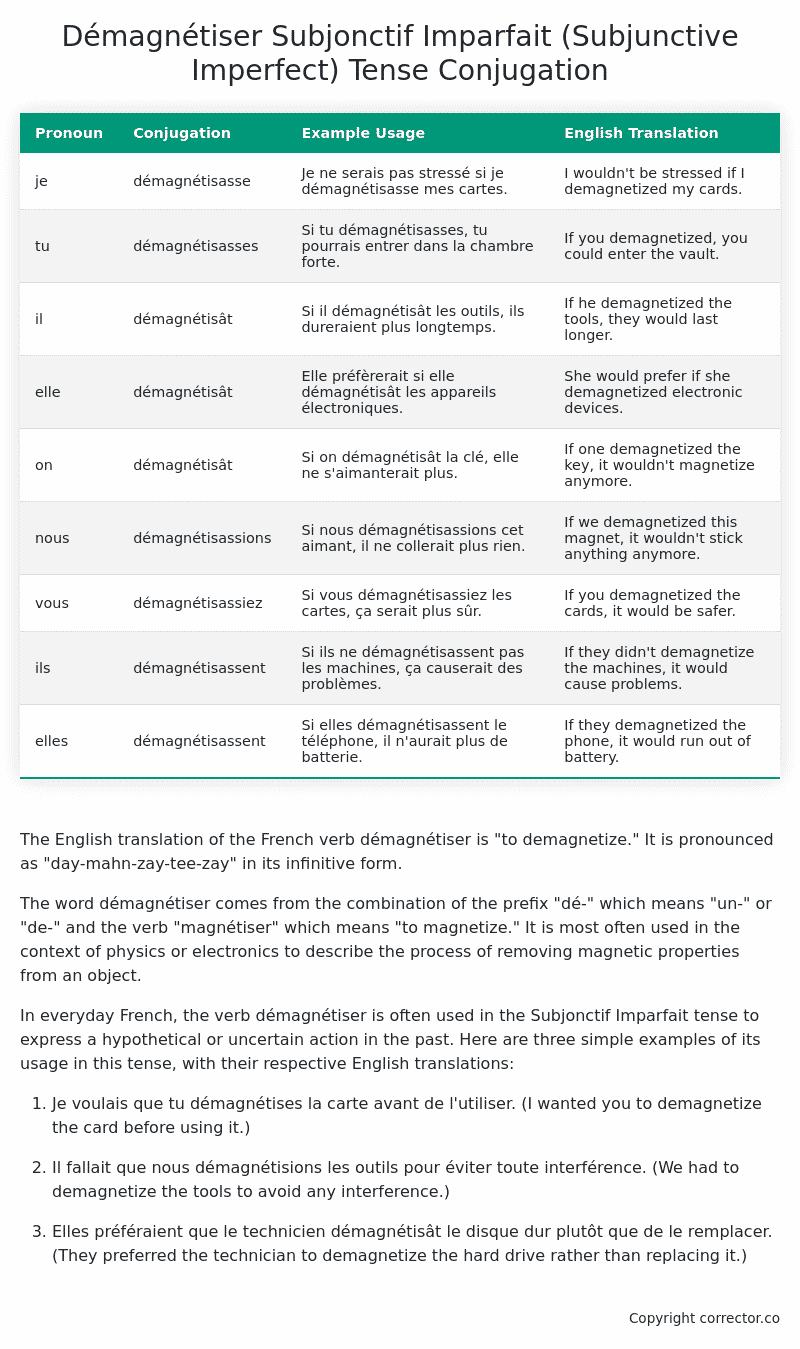Subjonctif Imparfait (Subjunctive Imperfect) Tense Conjugation of the French Verb démagnétiser
Introduction to the verb démagnétiser
The English translation of the French verb démagnétiser is “to demagnetize.” It is pronounced as “day-mahn-zay-tee-zay” in its infinitive form.
The word démagnétiser comes from the combination of the prefix “dé-” which means “un-” or “de-” and the verb “magnétiser” which means “to magnetize.” It is most often used in the context of physics or electronics to describe the process of removing magnetic properties from an object.
In everyday French, the verb démagnétiser is often used in the Subjonctif Imparfait tense to express a hypothetical or uncertain action in the past. Here are three simple examples of its usage in this tense, with their respective English translations:
-
Je voulais que tu démagnétises la carte avant de l’utiliser. (I wanted you to demagnetize the card before using it.)
-
Il fallait que nous démagnétisions les outils pour éviter toute interférence. (We had to demagnetize the tools to avoid any interference.)
-
Elles préféraient que le technicien démagnétisât le disque dur plutôt que de le remplacer. (They preferred the technician to demagnetize the hard drive rather than replacing it.)
Table of the Subjonctif Imparfait (Subjunctive Imperfect) Tense Conjugation of démagnétiser
| Pronoun | Conjugation | Example Usage | English Translation |
|---|---|---|---|
| je | démagnétisasse | Je ne serais pas stressé si je démagnétisasse mes cartes. | I wouldn’t be stressed if I demagnetized my cards. |
| tu | démagnétisasses | Si tu démagnétisasses, tu pourrais entrer dans la chambre forte. | If you demagnetized, you could enter the vault. |
| il | démagnétisât | Si il démagnétisât les outils, ils dureraient plus longtemps. | If he demagnetized the tools, they would last longer. |
| elle | démagnétisât | Elle préfèrerait si elle démagnétisât les appareils électroniques. | She would prefer if she demagnetized electronic devices. |
| on | démagnétisât | Si on démagnétisât la clé, elle ne s’aimanterait plus. | If one demagnetized the key, it wouldn’t magnetize anymore. |
| nous | démagnétisassions | Si nous démagnétisassions cet aimant, il ne collerait plus rien. | If we demagnetized this magnet, it wouldn’t stick anything anymore. |
| vous | démagnétisassiez | Si vous démagnétisassiez les cartes, ça serait plus sûr. | If you demagnetized the cards, it would be safer. |
| ils | démagnétisassent | Si ils ne démagnétisassent pas les machines, ça causerait des problèmes. | If they didn’t demagnetize the machines, it would cause problems. |
| elles | démagnétisassent | Si elles démagnétisassent le téléphone, il n’aurait plus de batterie. | If they demagnetized the phone, it would run out of battery. |
Other Conjugations for Démagnétiser.
Le Present (Present Tense) Conjugation of the French Verb démagnétiser
Imparfait (Imperfect) Tense Conjugation of the French Verb démagnétiser
Passé Simple (Simple Past) Tense Conjugation of the French Verb démagnétiser
Passé Composé (Present Perfect) Tense Conjugation of the French Verb démagnétiser
Futur Simple (Simple Future) Tense Conjugation of the French Verb démagnétiser
Futur Proche (Near Future) Tense Conjugation of the French Verb démagnétiser
Plus-que-parfait (Pluperfect) Tense Conjugation of the French Verb démagnétiser
Passé Antérieur (Past Anterior) Tense Conjugation of the French Verb démagnétiser
Futur Antérieur (Future Anterior) Tense Conjugation of the French Verb démagnétiser
Subjonctif Présent (Subjunctive Present) Tense Conjugation of the French Verb démagnétiser
Subjonctif Passé (Subjunctive Past) Tense Conjugation of the French Verb démagnétiser
Subjonctif Imparfait (Subjunctive Imperfect) Tense Conjugation of the French Verb démagnétiser (this article)
Conditionnel Présent (Conditional Present) Tense Conjugation of the French Verb démagnétiser
Conditionnel Passé (Conditional Past) Tense Conjugation of the French Verb démagnétiser
L’impératif Présent (Imperative Present) Tense Conjugation of the French Verb démagnétiser
L’infinitif Présent (Infinitive Present) Tense Conjugation of the French Verb démagnétiser
Struggling with French verbs or the language in general? Why not use our free French Grammar Checker – no registration required!
Get a FREE Download Study Sheet of this Conjugation 🔥
Simply right click the image below, click “save image” and get your free reference for the démagnétiser Subjonctif Imparfait tense conjugation!

Démagnétiser – About the French Subjonctif Imparfait (Subjunctive Imperfect) Tense
Formation
Common Everyday Usage Patterns
Interactions with Other Tenses
Subjonctif Présent
Indicatif Passé Composé
Conditional
Conditional Perfect
Summary
I hope you enjoyed this article on the verb démagnétiser. Still in a learning mood? Check out another TOTALLY random French verb conjugation!


